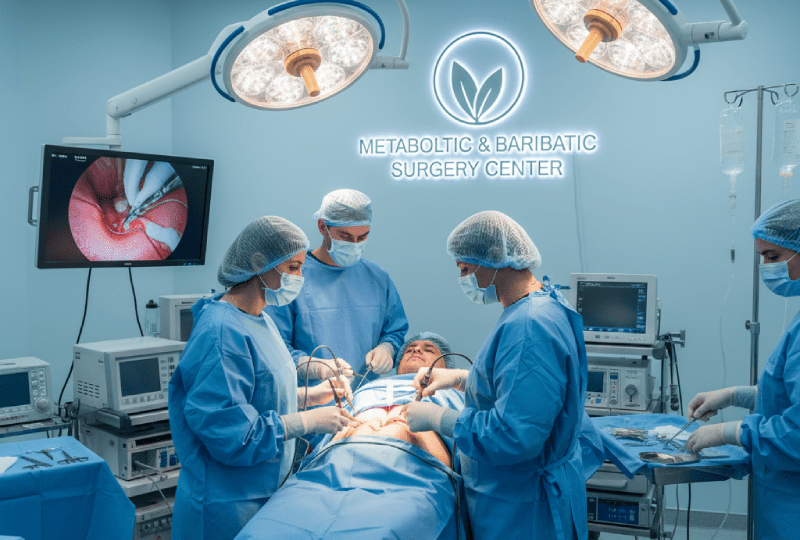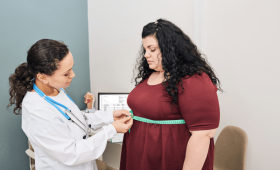What is Gastric Sleeve Surgery?
Gastric sleeve surgery, medically known as sleeve gastrectomy, is a surgical method used in the treatment of obesity. This operation is performed by irreversibly removing approximately 80% of the stomach’s volume. The remaining stomach takes the shape of a thin, banana-like tube. This procedure restricts the patient’s food intake and has a significant effect on appetite control. Since the fundus, the part of the stomach that secretes the hunger hormone ghrelin, is removed, a noticeable decrease in the patient’s appetite is observed after the surgery. This increases the success of the operation in the weight loss process. The gastric sleeve is not just a weight loss tool, but also a metabolic surgery that helps improve many health problems associated with obesity (type 2 diabetes, high blood pressure, sleep apnea, etc.). The surgery is usually performed using a laparoscopic (closed) method, which means smaller incisions, less pain, and a faster recovery process.
How Does Gastric Sleeve Work? What is Its Mechanism?
The basic working principle of gastric sleeve surgery is two-fold. First, physical restriction. Since a large portion of the stomach is removed, the patient feels full by consuming a much smaller amount of food. This automatically leads to a decrease in daily calorie intake. The second is hormonal change. The fundus of the stomach produces a large portion of the ghrelin hormone, which controls appetite and causes a feeling of hunger. The surgical removal of this section significantly reduces the level of ghrelin in the body. Therefore, the patient loses weight not only because they can eat less, but also because they feel less hungry. This hormonal effect plays a critical role in the long-term success of the surgery. The combination of these two mechanisms accelerates and sustains weight loss. Since the surgery does not make a major change to the anatomical structure of the digestive system, the normal processes of food digestion and absorption are preserved.
Who is Suitable for Gastric Sleeve Surgery?
Gastric sleeve surgery is not a procedure for everyone. Suitability criteria are determined in line with international guidelines and the experience of Turkish physicians. Individuals who generally meet the following conditions are considered suitable candidates for surgery:
- Those with a Body Mass Index (BMI) of 40 and above: This category is defined as morbid obesity and provides first-degree suitability for surgery.
- Those with a BMI between 35-40 with co-morbidities related to obesity (diabetes, high blood pressure, sleep apnea, joint problems, etc.): In these individuals, since obesity seriously affects their quality of life and overall health, surgical treatment becomes an option.
- Those with a BMI between 30-35 and an uncontrolled metabolic disease such as type 2 diabetes: In some special cases, especially for the purpose of metabolic surgery, patients in this BMI range can also be considered. Candidates are also expected to have the psychological and mental maturity to adapt to the lifestyle changes required by the surgery.
Body Mass Index (BMI) and Gastric Sleeve Relationship
Body Mass Index (BMI) is a value obtained by dividing a person’s weight by the square of their height and is widely used to determine the degree of obesity. This is one of the most fundamental suitability criteria for gastric sleeve surgery. Individuals with a BMI of 40 and above are generally those who have not achieved sufficient results with other treatment methods (diet, exercise, etc.) and are at risk of morbid obesity. For those with a BMI between 35-40, the decision to undergo surgery is usually based on the presence of obesity-related health problems such as high blood pressure, type 2 diabetes, sleep apnea, or severe joint problems. These diseases increase the urgency of weight loss and make surgery a logical option. Health authorities and physicians in Turkey evaluate patients by taking these international standards into account.
What are the Benefits of Gastric Sleeve Surgery?
Gastric sleeve surgery offers much more than just weight loss. The benefits provided by the surgery are as follows:
- Effective and Permanent Weight Loss: Patients are expected to lose a large portion of their excess weight within the first 1-2 years after surgery.
- Improvement in Metabolic Diseases: The symptoms of obesity-related diseases such as type 2 diabetes, high blood pressure, and high cholesterol largely subside or disappear completely. This allows many patients to reduce or completely stop their medication use.
- Increased Quality of Life: Physical mobility increases, and respiratory problems such as sleep apnea improve.
- Psychological Benefits: Increased self-confidence, easier participation in social activities, and a decrease in problems like depression caused by obesity are observed.
- Long-Term Health: The risk of serious health problems such as cancer, heart disease, and stroke caused by obesity is reduced.
How Much Weight is Lost with Gastric Sleeve Surgery?
The weight loss process after gastric sleeve surgery varies from person to person, but generally, satisfactory results are obtained. Patients are aimed to lose 30-50% of their excess weight in the first 6 months and 60-70% within a year. This depends on the person’s starting weight and how well they adapt to post-surgery lifestyle changes. The fastest weight loss is usually experienced within the first 3-6 months. Surgery is not a magic wand; successful results must be supported by proper eating habits and regular physical activity. The weight loss process is like a marathon; it requires patience, discipline, and determination. It should be remembered that the goal of the surgery is to reach a healthy weight, not an ideal model size.

Is It Possible to Maintain Weight After Surgery?
Maintaining weight after surgery is perhaps the most important stage of the weight loss process. The gastric sleeve makes it easier for the patient to control their portions, but this does not prevent poor food choices. Post-surgery weight maintenance requires adopting a lifelong lifestyle change. These changes include:
- Balanced Diet: Eating foods high in protein, vegetables, and fruits.
- Avoiding Sugar and Processed Foods: These types of foods can easily lead to weight gain because they are high in calories.
- Regular Exercise: Activities such as walking, swimming, or cycling speed up metabolism and help with weight control.
- Follow-up Visits: Regular check-ups with a dietitian and a doctor help maintain motivation and detect potential problems early. All these steps ensure that the lost weight is permanent.
Risks and Complications of the Surgery
As with any surgical procedure, gastric sleeve surgery also has some risks and potential complications. Although these are generally rare, it is important for patients to be informed about them. The main risks are:
- Leakage: Small holes in the suture line can cause stomach contents to leak into the abdominal cavity. This is the most serious complication requiring immediate intervention. This risk has been minimized in Turkey by experienced surgeons and modern hospitals.
- Bleeding: Bleeding can occur during or after the surgery.
- Infection: Incision site infections or intra-abdominal infections can occur.
- Blood Clotting: There is a risk of clot formation, especially in the leg veins (deep vein thrombosis).
- Vitamin and Mineral Deficiencies: Since the diet changes after the surgery, deficiencies in vitamins and minerals such as B12, D vitamin, iron, and calcium can occur. Therefore, supplements are of vital importance.
The Preparation Process: The Path to Surgery
The process of deciding on and preparing for gastric sleeve surgery is critically important for the patient’s successful outcome. This process is usually managed by a multidisciplinary team and includes:
- Internal Medicine Examination: Evaluation of the patient’s general health status before surgery.
- Cardiology Examination: Checking heart health.
- Endoscopy: Examination of the condition of the stomach and whether there is any situation that would prevent the surgery.
- Psychiatry/Psychology Evaluation: Evaluation of whether the patient is psychologically ready for the surgery, the potential for eating disorders, and the ability to adapt to post-surgery lifestyle changes.
- Meeting with a Dietitian: Creating pre- and post-surgery nutrition plans and educating the patient on this matter.
- Pre-Surgery Diet: A special diet is followed for a few weeks before the surgery to reduce liver fat and facilitate the operation.
Surgery Day and Hospital Stay
On the day of the surgery, patients usually arrive at the hospital early in the morning. The surgery is performed under general anesthesia and takes approximately 1-2 hours. Gastric sleeve surgery is performed using the laparoscopic (closed) method, which means several small incisions are made in the abdominal area. The surgeon performs the operation with instruments inserted through these incisions. After the surgery is completed, patients are taken to the recovery room and then to their rooms. The hospital stay usually varies between 2-4 days. During this time, patients slowly begin to walk and start a liquid diet. Doctors and nurses closely monitor the patient’s condition and provide support for pain management.
Post-Surgery Gastric Sleeve Diet
Post-surgery nutrition is a lifelong adaptation process and one of the most important factors for the success of the surgery. The nutrition plan includes a gradual transition to solid foods, starting from the first weeks after the surgery. This plan allows the stomach to heal and adapt to its new volume.
- First 2-3 Weeks: Only liquid foods (water, broth, strained soups, etc.) are consumed.
- Weeks 3-6: Pureed foods (pureed vegetables, yogurt, soft cheeses, etc.) are added to the diet.
- After Week 6: Solid foods are slowly transitioned to with the approval of the doctor and dietitian. It is important to chew each bite well, eat slowly, and not consume liquids during meals. These habits help with eating without straining the stomach or feeling discomfort.
The Liquid Diet Period: First Steps
The first 1-2 weeks after surgery is the “liquid diet” period, during which only clear liquids are consumed. The purpose of this period is to allow the stomach sutures to heal and the swelling to decrease. Liquids that can be consumed include water, sugar-free and caffeine-free herbal teas, fat-free meat or chicken broth, and strained vegetable soups. Products containing lactose such as milk and ayran are generally not recommended at this stage, but they can be consumed with the doctor’s approval. During this period, it is very important to drink fluids in small sips at regular intervals to prevent dehydration. If any discomfort, nausea, or pain is felt, a doctor should be consulted immediately.
The Puree Diet Period and Transition
Following the liquid diet period, the puree diet period begins around the 3rd week. During this period, soft and pureed foods that are easy to digest are started to be consumed. Examples include boiled and blended vegetables, yogurt, cream cheese, pureed fish or chicken, and soft-boiled eggs. At this stage, special attention should be paid to protein intake because proteins are vital for tissue repair and maintaining muscle mass. It is important to try each new food one by one and observe how the body reacts. It is necessary to continue eating slowly, chewing each bite for a long time, and keeping meals small.
Transition to Solid Foods and Long-Term Nutrition
Starting around the 6th week, the puree diet is gradually replaced with solid foods. At this stage, well-cooked and soft foods are preferred in small portions. The secret to long-term success is to make healthy eating habits permanent at this stage.
- Protein Priority: Protein sources (lean meat, chicken, fish, legumes) should be consumed first at every meal.
- Vegetables and Fruits: Vegetables and fruits should be an important part of meals to get sufficient vitamins and fiber.
- Avoiding Sugary and Processed Foods: These types of foods can cause weight gain even with a reduced stomach volume.
- Liquid Consumption During and After Meals: To avoid overfilling the stomach and to facilitate digestion, liquids should not be consumed 30 minutes before and after meals.

Why Are Vitamin and Mineral Supplements Important?
After gastric sleeve surgery, since the stomach’s absorption surface and volume decrease, it can be difficult to get enough of the necessary vitamins and minerals for the body. This can lead to serious health problems such as anemia, bone loss, and nervous system problems in the long run. Therefore, vitamin and mineral supplements should be taken regularly as recommended by a physician and dietitian. In particular, supplements for B12 vitamin, D vitamin, iron, calcium, and folic acid may often be necessary for life. The regular use of these supplements is one of the most important parts of living a healthy life after surgery.
Post-Surgery Exercise and Activity
In the post-surgery recovery process, exercise plays a critical role in weight loss and weight maintenance. Immediately after the surgery, patients are encouraged to start walking to prevent blood clots. Light walks and home activities are sufficient for the first few weeks. After 4-6 weeks with the doctor’s approval, more intense exercises (running, swimming, cycling) can be started. Exercise helps maintain muscle mass, speed up metabolism, and prevent skin sagging. Furthermore, exercise reduces stress and improves mood, which helps the post-surgery period to be psychologically easier.
What Psychological Changes Does Gastric Sleeve Surgery Cause?
Obesity is a condition with not only physical but also deep psychological effects. Gastric sleeve surgery can help alleviate this psychological burden. As patients lose weight after surgery, their self-confidence increases, their social anxiety decreases, and they can participate more comfortably in social environments. This situation significantly improves overall life satisfaction and mood. However, sudden changes in diet after surgery can create new psychological challenges for those with a history of eating disorders or those who have an emotional connection with food. For this reason, getting psychological support before and after the surgery helps to manage the process in a healthier way.
Gastric Sleeve Surgery Costs and Insurance Coverage
The cost of gastric sleeve surgery varies depending on the hospital where the operation will be performed, the surgeon’s experience, and other services related to the surgery. In Turkey, the prices for this surgery can be at a more affordable level compared to international standards. This also makes Turkey an attractive destination for medical tourism. In Turkey, for patients who meet the BMI criteria, surgeries can be covered by the SSI (Social Security Institution) in state hospitals and some university hospitals. In private hospitals, the scope of private insurance varies depending on the insurance policy. The most accurate information on this matter can be obtained by contacting the hospital or the surgeon’s team you are considering for the surgery.
Quality of Life After Surgery
Gastric sleeve surgery significantly increases the quality of life of patients by eliminating the physical and psychological limitations brought on by obesity. After the surgery, patients can move more comfortably, get less tired, participate more in social activities, and generally feel better about themselves. The reduction of symptoms of chronic diseases, the decrease in medication use, and living a more energetic life are the most concrete indicators of this increase in quality of life. This turns the surgery from just a weight loss operation into a journey toward a healthier and happier life.
Celebrities Who Had Gastric Sleeve Surgery and Their Stories
Many famous people around the world and in Turkey have been in the public eye with the weight they lost through gastric sleeve surgery. These stories are a source of inspiration for many people struggling with obesity. Such examples demonstrate how effective the surgery can be and how it can transform a life. However, every individual’s story and process is different. The decision to have or not to have surgery is a personal one, and when making this decision, it is important to realistically evaluate your own health status and expectations rather than celebrity stories.
Failure Rates and Reasons
Gastric sleeve surgery is a method with a high success rate in the treatment of obesity. However, as with any surgical procedure, in some cases, the expected results may not be achieved. Failure of the surgery is generally considered to be when sufficient weight loss is not achieved within the first two years or when the lost weight is regained. The most common reasons for failure are:
- Non-compliance with Lifestyle Changes: Not adhering to the post-surgery nutrition rules and exercise plan.
- High-Calorie Liquid Foods: Although gastric sleeve surgery restricts solid foods, weight can be easily gained with sugary drinks and high-calorie liquids.
- Psychological Factors: The recurrence of eating disorders or the continuation of emotional eating habits after surgery. Therefore, multidisciplinary follow-up and psychological support before and after the surgery are very important.
Gastric Sleeve and Metabolic Diseases
Gastric sleeve surgery not only provides weight loss but is also very effective in the treatment of metabolic diseases such as type 2 diabetes. Changes in hormone levels after surgery reduce insulin resistance and regulate blood sugar levels. This allows many type 2 diabetes patients to stop their medications or reduce their doses. The surgery also helps improve other obesity-related diseases such as high blood pressure, sleep apnea, and high cholesterol. This makes gastric sleeve surgery not just an obesity surgery, but also a serious metabolic surgery.
Revision Surgeries: What to Do If Necessary?
After gastric sleeve surgery, in rare cases, situations such as insufficient weight loss or regaining weight may occur. In such a situation, revision surgeries can be an option. Revision surgeries are performed in cases such as the expansion of the stomach after the first surgery, insufficient weight loss, or the continuation of co-morbidities. Usually, a more comprehensive operation such as a gastric bypass is performed as a revision surgery after a gastric sleeve. Since revision surgeries can be more complex and risky, this decision must be carefully evaluated by an experienced surgeon and a multidisciplinary team.
Gastric Sleeve Surgery in Turkey: Why Turkey?
Turkey has become a globally preferred destination for gastric sleeve and other bariatric surgery operations. The main reasons for this are:
- Experienced Surgeons: There are many surgeons in Turkey who specialize in bariatric surgery, are internationally recognized, and have a high number of cases.
- Modern Hospitals: Turkish hospitals are equipped with the latest technological equipment and have international accreditations.
- Affordable Prices: The cost of surgery is more economical compared to countries like Europe and America. This offers the opportunity to access quality service at more affordable prices.
- Medical Tourism Services: Many hospitals offer comprehensive service packages for patients coming from abroad, such as accommodation, transfer, and interpreter services. This allows patients to be comfortable throughout the entire process.
- Geographical Location: Turkey’s geographical location provides easy access from many countries in Europe, Asia, and the Middle East.
Is Gastric Sleeve Surgery a Permanent Solution?
Gastric sleeve surgery is an extremely effective and powerful tool in the fight against obesity. The surgery not only reduces the volume of the stomach but also affects the hormones that control appetite. However, gastric sleeve surgery is not a magic wand. For the surgery to be a permanent solution, the patient must make radical and lasting changes in their lifestyle. Regular exercise, a balanced diet, and the regular use of necessary vitamin supplements are the keys to the long-term success of the surgery. This is a journey that requires lifelong determination and discipline. The surgery provides you with the greatest support on this journey, but the steering wheel is always in your hands.
Warning: This article is for informational purposes only. If you are considering a serious surgical procedure like gastric sleeve surgery, you should definitely consult with a specialist physician and carry out the entire process with a professional team.


